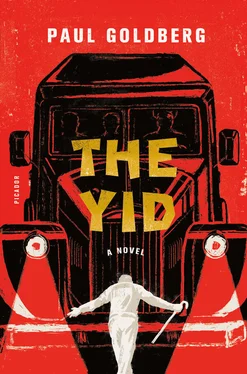“Then we are done,” says Levinson, handing Lewis a mirror.
This time, Levinson’s work is almost subtle. To avoid the cadaverous look, he made a thinner mixture of grease cream and toothpowder. Instead of forming a solid layer of white, this produces a screen that shows variations of Lewis’s natural pigmentation. The rouge, however, is a little much, and on the background of light skin, Lewis’s lips look cherry red.
“You look like a harlot, Lewis,” says Kogan, considering his new appearance.
“Actually, I believe that now I look Jewish.”
“You look like Pushkin,” says Levinson.
Indeed, with his skin tone lightened, Lewis bears an uncanny resemblance to Russia’s greatest poet, Aleksandr Sergeyevich Pushkin. This is not accidental, since Pushkin was the great-grandson of a Negro named Abram Hannibal by his master, Peter the Great.
* * *
At the post office, coughing into the telephone, Lewis makes a convincing impression of sickness. First, he speaks with a secretary at the Stalin Auto Plant in Moscow. Were it not for a problem with the assembly line at Stalin, Lewis would have been safely at home in Novosibirsk. After calling in sick, Lewis orders a long-distance call to Novosibirsk, to let his secretary know that he will stay in Moscow a little longer. He is free.
On a sunny afternoon, when snow squeaks underfoot, everyone is a survivor. The odds notwithstanding, Lewis feels that he is going to live. How will he get out of this? That is a matter of logistics, and engineers are good with logistics.
Emerging from the underpass at the railroad station, Lewis realizes that two young men are walking behind him.
He needs to turn left, toward the cemetery. Instead, he turns right. The young men stay close. He takes a left turn, this time heading toward the summer theater. The young men follow. Lewis quickens his pace. The young men do the same.
Langston Hughes, Paul Robeson, and many others noted that being a Negro in Stalin’s Russia means not worrying about getting beaten up in the street. Lewis has nearly forgotten his old fear of venturing into the wrong neighborhood, asking for a beer in the wrong bar, looking at the wrong woman, or saying the wrong thing.
Now, in whiteface, he needs to draw on the instincts that kept him alive long enough to get to Magnitogorsk.
“Gloves … am I wearing gloves?” he asks himself. He is.
With gloves on, he can throw a punch without revealing the pigmentation of his fists.
Growing up on America’s streets, Lewis knows how to savor the violence of a brawl. He never looks for fights, and the fights that have found him haven’t been too bad (he still has his teeth), but the fantasy of busting a nasty-ass racist Irish cop in the balls still lurks within his soul.
Lewis is uniquely positioned to understand that racist mythology of Old Europe is about blood. Their niggers — the Jews — are said to suck the blood of Christians. The New World is beyond blood libel. Even America’s lone anti-Semitic court case — Leo Frank of Atlanta — is about a Jew fucking and killing a white girl. Poor Leo was in a minority of one, the only American Jew to learn what Negroes like Lewis knew from birth: America is about semen.
Yes, Lewis savors the prospect of leading the two bastards into a deserted street and relegating them to a life of impotence and incontinence. And if they carry knives, that matters little. Lewis has a pistol.
“Should I prevail?” he asks himself and, his impulses notwithstanding, realizes that triumph is not an option.
* * *
Lewis’s peril that day is unrelated to nasty-ass Irish cops and pigmentation. Leo Frank, too, is irrelevant.
One of the young men who spots Lewis is named Anatoly Germanovich Krutyakov. In the streets he is known by the unlikely name Kent. Born on July 31, 1935, he is on the nineteenth year of life.
Seven months earlier, Kent was freed from the Matrosov Colony for Underaged Criminals, outside the city of Ufa, in Bashkiria, where he served a four-year term for an attempt to pick pockets.
It’s difficult to determine conclusively how the name Kent entered the Soviet underworld. Was it through one of many Dukes of Kent in Shakespeare, perhaps even Lear’s faithful friend? Retelling of plays, novels, and films was a common way for prisoners to while away the hours, and good storytellers often found themselves under the protection of thugs craving adaptations of The Count of Monte Cristo, Anna Karenina, Hamlet, or King Lear.
Adaptations spun by Moscow University students of literature, glum lieutenants from Warsaw, and elderly intellectuals of all sorts gave these classic stories a new life. As they passed through thugs, the stories were born yet again. Thus, in a surreal cultural-linguistic leap, Kent became a verb, skentovatsya , to “bekent,” to form a friendship, which in this setting describes forming a criminal association. On second thought, the word “conkent,” had it existed, would convey the meaning with greater precision.
At the colony, Kent met Tarzan (Vladimir Andreyevich Rozhnov, born October 29, 1936).
Tarzan was freed two months before Kent and awaited him outside the zone. Though neither of the young men would have characterized himself as a homosexual, they did make rooster, wherein the stronger, more massive Tarzan invariably assumed the superior position.
Both youths lost their parents early in life. Kent’s father, a tankist, was killed in the Battle of Kursk, and his mother died of typhus during evacuation. Tarzan’s father, an infantry lieutenant, was killed during the first weeks of the war, and his mother went from one set of hands to another.
Officially classified as individuals without a fixed address, Kent and Tarzan risk being picked up at any moment and taken back to the camps, this time as adults, for violation of residency requirements. Malakhovka has given them something of a refuge, thanks to a fortuitous meeting with another former young convict, whose mother had married a militia lieutenant. Bekenting the militia is the best bekenting of all.
The young men broke into a dacha that, judging by a large painting and a multitude of photographs on the walls, belonged to a violinist, and for the first time in their lives, they enjoyed something that could be described as domestic bliss.
Neither Kent nor Tarzan read newspapers, but they know enough to fear that an individual with an exaggerated nose (the term is nosatyy , the nosed one) might use a syringe of his own design to deliver a malignant injection. They know that Jews sit on sacks of money and use diamonds in secret prayer rituals. More than anything, they sense the fear of the nosed ones, and after years in camps and colonies for young criminals, they know that fear begets weakness and weakness opportunity.
If the nosed ones aren’t yet outside the law, they soon will be.
* * *
Lewis realizes that their encounter is imminent.
The first punch to his face will smudge the makeup and reveal the color of his skin. Gunfire — an uncommon event on Russia’s streets — will ultimately bring attention to Levinson and Kogan.
He will have to take one punch and fall facedown, letting the thugs kick his prostrate body. Lewis’s objective is a decisive, spectacular, humiliating defeat. He will play a coward, and maybe that will give the thugs enough satisfaction that they will go easier on his back.
“Ey, ty, bratishka, postoy,” shouts Tarzan. Hey, you, brother, wait.
Lewis turns around, flashing the men a buttery smile.
“A kto mene zovyot?” he asks with an exaggerated Yiddish accent. And who calls?
He will play Yid. He’ll give them uvular r ’s, with e ’s replacing ya ’s, with questions that answer questions (and why not?), with phrases that begin with prepositions, and with inflections that soar. He’ll give them a nar. A fool. He’ll give them Tevye, Menakhem-Mendel, Benjamin III. He’ll give them a caricature of caricatures.
Читать дальше












